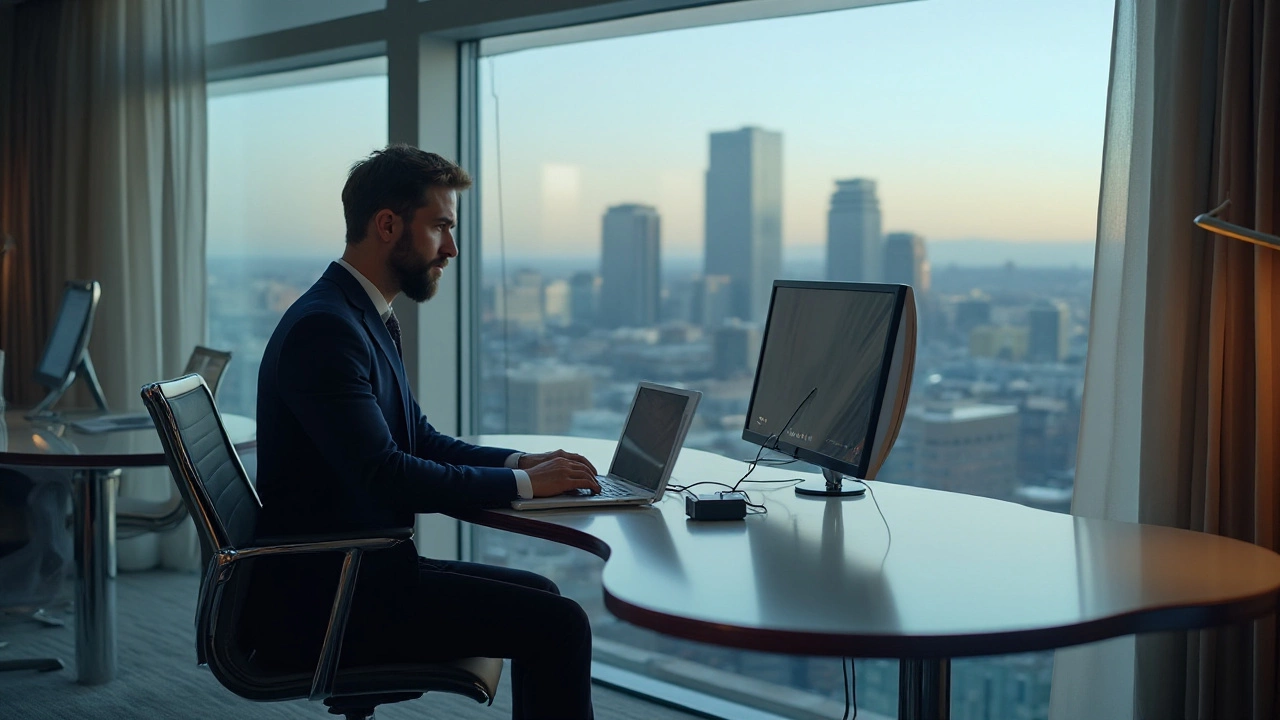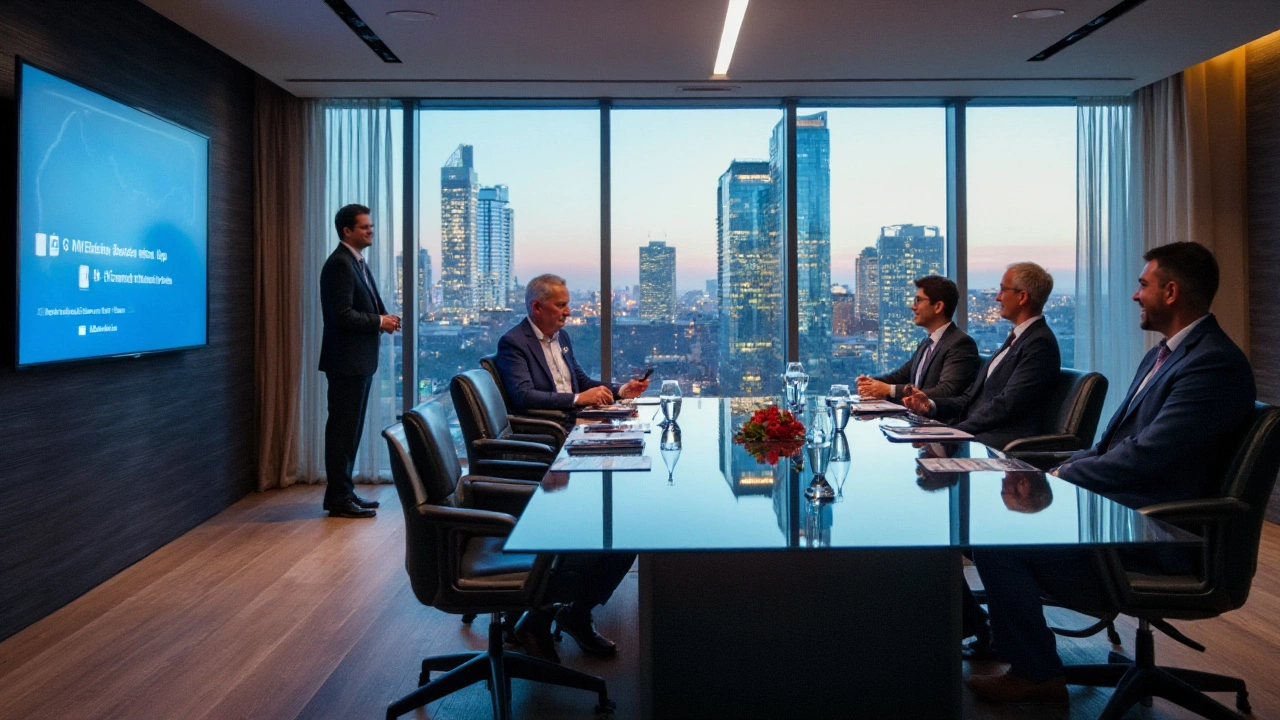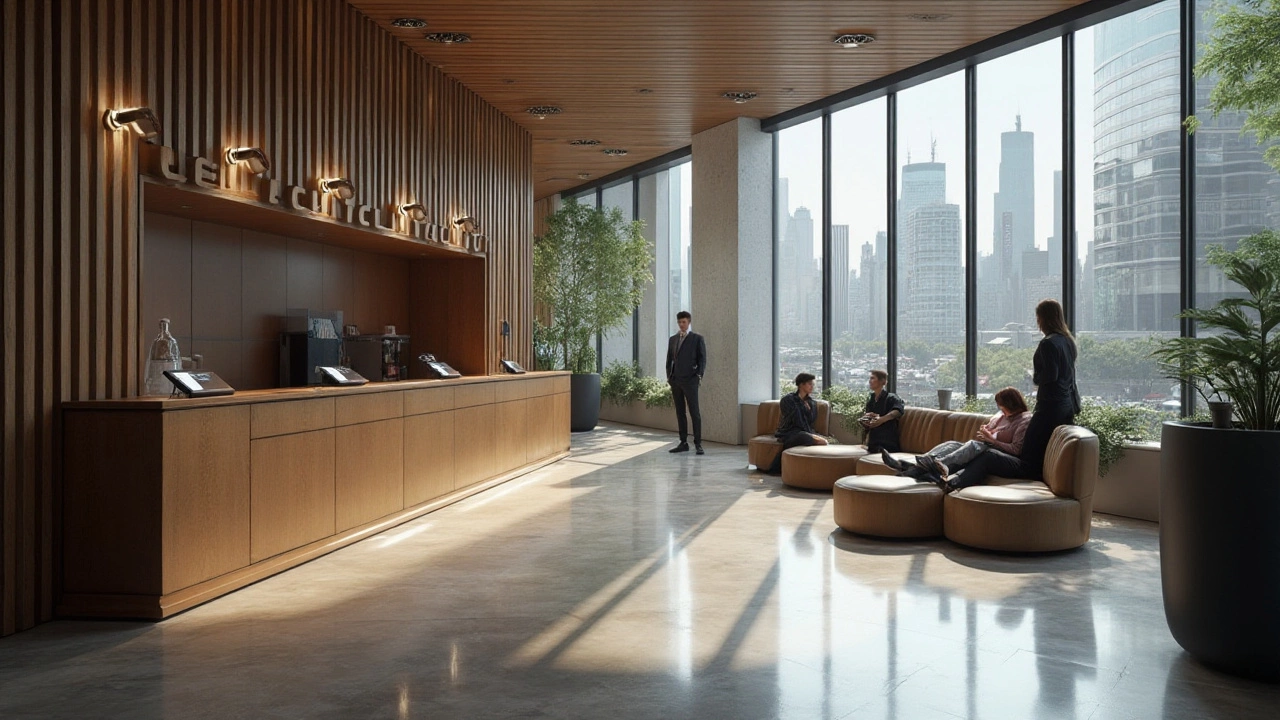Imagine a weary business traveler checking into a hotel, eyes scanning for a hint of comfort or a sign of efficient service. For business hotels, meeting these expectations involves more than plush pillows and room service at the push of a button. It's about creating a seamless blend of convenience, technology, comfort, and connectivity.
The modern business hotel serves as a sanctuary for work and rest, necessitating well-thought-out amenities and strategic placement in city hubs. From high-speed Wi-Fi to agile meeting spaces and memorable dining experiences, these factors collectively forge the backbone of a successful business hotel.
Understanding the needs of corporate guests can transform a hotel from a simple shelter into a pivotal player in their professional journey. Let’s delve into the core attributes that lay the foundation for an outstanding business hotel experience.
- Prime Location and Accessibility
- Technological Amenities and Connectivity
- Comfort and Convenience in Accommodations
- Dining and Meeting Facilities
- Customer Service and Personalization
Prime Location and Accessibility
Selecting the right location can be the make-or-break factor for any business hotel. Business travelers often look to maximize efficiency, and being close to significant business districts, airports, and transport hubs can immensely aid their itineraries. A prime location not only reduces travel time but often places guests amidst the vibrant heartbeat of the city, providing a window to both work and leisure opportunities. Consider cities like New York or Tokyo, where the most sought-after business hotels are strategically positioned near landmarks or transit routes that facilitate smooth navigation for their guests.
Accessibility stretches beyond mere proximity to transport and must include thoughtful inclusivity for guests with varying needs. Compliance with accessibility standards ensures individuals with disabilities, such as mobility issues or sensory impairments, can enjoy the hotel’s facilities without barriers. These considerations are not just regulatory mindsets but are becoming keystones in the ethos of hospitality.
From airport shuttles to private taxis, the ways a hotel extends its location advantages to its guests can be diverse. A successful business hotel often partners with local transportation services or integrates digital transportation solutions, allowing guests to traverse the city effortlessly. This seamless integration of services not only enhances convenience but also adds a layer of local immersion for guests venturing beyond their conference rooms.
In an engaging quote from renowned hospitality expert Michael Levin, he noted,
"The location of a hotel sits on a client’s itinerary as much as a cup of coffee during a meeting. It’s a merge of productivity and pleasure, offering both through a wordless welcome."This emphasis on locality and service underpins the need for hotels to mold their environment and connect with the city’s pulse — allowing them to fit into the guest's narrative purposefully.
Technological Amenities and Connectivity
For business hotels, remaining adept in the rapidly advancing realm of technology is a necessity rather than a luxury. The expectation for robust technological amenities and connectivity has evolved into a primary benchmark for evaluating a business hotel's true worth. Business travelers rely heavily on these features to seamlessly maintain their workflow and stay connected with global teams. Therefore, providing guests with high-speed Wi-Fi, secure networks, and modern office equipment is indispensable. A common sight in lobbies of leading business hotels is the ring of glowing laptop screens set upon sturdy tables, a testament to the essential role of dependable internet access.
Many leading hotels have already started embracing advanced solutions such as digital check-ins and mobile room keys to expedite the check-in process. Such innovations cater to the time-sensitive nature of business travels, ensuring that digital convenience and time efficiency are prioritized. A study by a renowned industry analyst revealed that nearly seventy percent of hotel guests prefer hotels that offer mobile check-in options.
Echoing this trend, Daniel Krisch, a well-respected hospitality expert, once noted, ":As guests become increasingly tech-savvy, hotels must mirror this transformation, ensuring their facilities align with the digital expectations of their clientele.":
Business destinations have morphed into collaborative hubs where travelers expect an environment conducive to networking and productivity. The integration of video conferencing facilities and rooms equipped with multimedia support further complements this. Many such hotels also have dedicated business centers, which provide a range of services from printing to scanning, catering to every professional need. Features such as wireless hotspots in public areas and shared coworking spaces have received significant appreciation from travelers seeking flexible work environments.
Despite the focus on cutting-edge amenities, security remains a priority. With a significant proportion of business transactions taking place online, ensuring cyber safety is paramount. Savvy hotels have begun incorporating additional layers of digital protection, such as encrypted networks and secure payment systems. Around thirty percent of business hotels have reported an increase in customer trust since implementing these security measures.
It is also worthy to note how some hotels are leveraging the Internet of Things (IoT) to enhance guest experiences. With IoT, rooms can adapt to guests' preferences, adjusting temperature and lighting based on occupancy. Nearly forty percent of modern business hotels have begun deploying sensors and smart thermostats, creating an ambience tailored to enhance comfort while maintaining energy efficiency. Such charming modern touches show how vital technology has become in weaving together both hospitality and functionality in the travel accommodations sector.

Comfort and Convenience in Accommodations
In the realm of business hotels, comfort and convenience are not just luxuries but essential elements of the guest experience. The notion of comfort starts with the room design itself. Spacious layouts with ergonomic furniture contribute to a relaxed vibe, eliminating the clutter that so often accompanies a corporate traveler’s life. A bed that invites a deep, rejuvenating sleep isn’t just a hallmark of good service; it’s a true necessity for anyone visiting on business, often exhausted from jet lag or hours of meetings. The careful selection of high-thread count linens and pillows meant to suit all sleep preferences can greatly enhance their stay.
These hotels often include thoughtful touches like blackout curtains to ensure guests can rest at any time of the day, as well as effective climate control that allows a visitor to tailor their environment for maximum comfort. It's these seemingly small details that add layers of comfort and transform an accommodation into a haven amidst a bustling schedule. Providing a variety of pillows or the option to request additional bedding showcases a thoughtful approach to guest satisfaction.
On the technological front, maintaining optimal connectivity is vital. Many business travelers depend on robust, uninterrupted Wi-Fi services to complete their daily work duties. Moreover, the setup of in-room tech, including charging docks, multiple plug points, and smart TVs, can make the difference between frustration and a seamless work-life balance. That there is a growing demand for AI-driven room enhancements like smart thermostats and voice-activated assistants, indicates a shift towards more tech-savvy accommodations.
"A comfortable environment is crucial as it affects a guest's productivity - their space should offer a restful atmosphere while being equipped to serve as an effective remote office," notes a leading hospitality tech consultant.
Reminiscent of home comforts, amenities like a well-stocked minibar, convenient coffee machines, and room service menus featuring nutritious meals cater to the unique needs of business travelers. Often, the hospitality industry responds to dietary trends by including healthy and varied options that can rejuvenate the mind and body.
Moreover, offering facilities such as laundry services or even valet laundry can be crucial for on-the-go professionals needing a refresh in their wardrobe. A well-appointed gym or access to wellness services, like saunas or yoga classes, can provide the perfect escape from work stresses, balancing their mental and physical health.
Travel accommodations within walking distance to key city centers or with access to transport hubs offer the convenience of reducing travel stress and time, allowing more room for relaxation and preparation. Business hotels that succeed in these domains acutely understand that their role is not only to provide a night’s sleep but a vital support for creativity and output. By creating an environment that nurtures these aspects, they can significantly enhance their guests’ professional journey.
Dining and Meeting Facilities
Business travelers often find themselves in need of more than just a place to lay their heads. One important aspect of their travel itinerary is successful meetings. A business hotel must offer meeting facilities that cater to diverse needs, ranging from board meetings to conferences. What sets exceptional business hotels apart is their ability to provide spaces that are adaptable and equipped with the latest technology. Offering things like high-speed internet access, large screens for presentations, and flexible seating arrangements facilitates productive sessions and leaves a lasting impression on guests.
Guests also turn to business hotels for their dining experiences. Good food fuels both body and mind, which is critical during busy business trips. Gourmet dining on-site can be a deciding factor for many business travelers. The menu often reflects innovation and authenticity, catering to the varied palate of international clientele. From a quick breakfast meeting to elaborate client dinners, the ideal business hotel ensures that its dining services enhance guests' experiences. The culinary team is usually tasked with creating dishes that offer a sense of the local culture but with a flair that appeals to global tastes.
Quality meeting facilities go hand-in-hand with reliable dining services. It is not uncommon for a hotel's conference area to be directly linked to its restaurant, providing seamless transitions between work and leisure, which is particularly vital during extended sessions where breaks may be scarce. For instance, participants can quickly shift from focused boardroom discussions to celebratory meals without logistics issues. A comprehensive offering may include packages that pair meeting room usage with meal plans, which can be a significant convenience for event organizers.
Interestingly, according to a study by the Global Business Travel Association, 77% of business travelers prioritize hotels that offer robust dining options and flexible meeting spaces, recognizing their dual role in creating a successful business trip.
'In our fast-paced world, the ability to meet and eat in the same venue often spells the difference between a productive trip and an average one,' states Carolyn Pearson, a travel expert. 'Business hotels that master this balance often see repeat clientele,' she continues, highlighting the critical nature of these facilities.
Though space is often reimagined in such environments, the attention to aesthetics and functionality does not take a backseat. A growing number of hotels invest in eco-friendly designs and sustainable food sources, emphasizing social responsibility. Additionally, they might offer unique architectural touches that give a sense of place while ensuring comfort. Many guests, on another note, appreciate wellness menus or environmentally sound options, a nod to the increasing awareness and requests for sustainable travel practices. Dining and meeting facilities that incorporate these features not only stand out but also cater to an audience that values ethical practices.

Customer Service and Personalization
When stepping into a business hotel, the warmth of genuine hospitality can set the tone for an entire stay. This experience is anchored in exceptional customer service and personalized attention to detail. In today's bustling world, guests appreciate when they are recognized not as mere numbers but as valued individuals with unique preferences and needs. This is where personalization in service becomes a transformative tool. It's no longer about simply providing a room; it's about tailoring the experience to suit the business traveler's tastes, from room settings to the type of welcome drink they prefer.
To achieve this, many hotels have embraced tech-driven check-ins, offering guests the luxury of choice at their fingertips. A guest can now customize their room temperature, lighting, and even entertainment options before they even set foot in the room. According to a survey conducted by the American Hotel and Lodging Association, more than 80% of frequent travelers expressed a preference for hotels that offer personalized experiences through technology and human interaction alike.
"Guests remember nurturing and attentive service more than the physical look of the hotels they stay in," notes Jane Smith, a respected hospitality consultant. Such insights highlight how service quality and personalization are pivotal in creating memorable stays.
Training staff to anticipate guest needs and respond swiftly is key. Employees empowered with the autonomy to make minute changes or offer bespoke solutions can elevate a standard visit to something exceptional. This approach fosters a trusting relationship, where guests feel valued and inclined to return. For instance, a traveler who consistently requests feather pillows might delight upon finding them pre-arranged during each stay, showcasing thoughtful attention to detail.
Feedback mechanisms also play a crucial role. Actively listening to guest feedback and implementing it can enhance personal interaction and service quality. Some hotels have adopted real-time digital feedback systems, allowing them to address concerns almost immediately, often before the guest has even left the property. This proactive approach not only resolves issues efficiently but also demonstrates a commitment to guest satisfaction.
Personalizing experiences doesn't stop at the front desk; it extends to every corner of hotel operations. Specially curated dining options and menus cater to dietary preferences ranging from vegan to gluten-free, ensuring every guest finds something delightful to savor. Some hotels take it a step further by offering private dining experiences tailored for business travelers looking to unwind or entertain clients in a secluded environment.
Ultimately, the art of customer service and personalization in a business hotel is about creating an atmosphere where the guest feels known, valued, and at ease. The blend of human touch and technological finesse here is not just a strategy; it becomes a philosophy that defines the brand identity of a hotel striving to cater to the nuanced needs of the corporate world. This approach not only helps in retaining customers but also attracts new ones through the powerful tool of word-of-mouth recommendations in the ever-evolving hospitality landscape.
